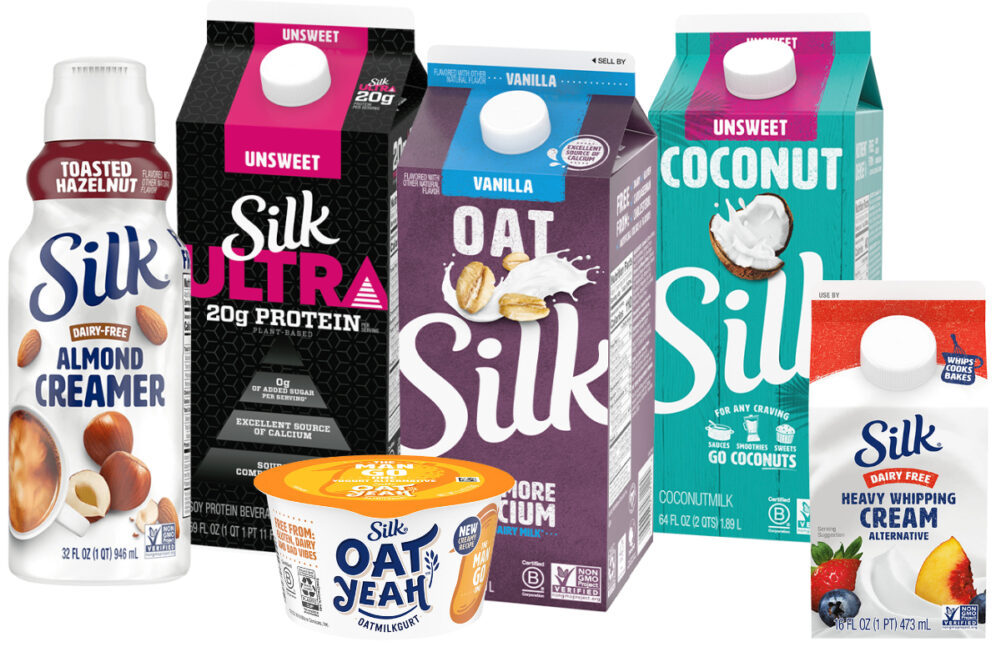PARIS — Danone SA has multiple plans for its Silk brand in North America.
“On plant-based beverages, our focus will be on further expanding almond and the soy segments where we are strong leaders while accelerating on the old opportunities,” said Juergen Esser, chief financial, technology and data officer for Danone, in an April 20 investor call.
The strategy comes as competition increases in the plant-based milk alternatives category. Sales of such items in the United States increased 20% in 2020 to reach $2.5 billion, according to data from the Plant Based Foods Association and The Good Food Institute.
“We are investing into the differentiation and superiority, especially of our Silk master brand as we speak,” Mr. Esser said. “We have started a new campaign on Silk almonds, and that shows first positive market share results. While on soy, we are reframing our portfolio, building on the nutritional benefit of that unique ingredient and are seeing also here first promising results, with the segment returning back to growth since the beginning of the year.”
A restaging of Silk oat products will focus on product and brand positioning.
“We are conscious that we need to catch up fast on this segment but are determined, and probably more importantly, we are confident in our ability to accelerate based on those initiatives,” Mr. Esser said.
North American plans for yogurt include restaging the Oikos Greek yogurt range and scaling up the Two Good brand.
“In parallel, we will accelerate on our other yogurt platforms, wellness and plant-based, which have been growing and gaining market share,” Mr. Esser said.
Paris-based Danone in the first quarter of the fiscal year posted sales of €5.66 billion ($6.81 billion), down 9% from €6.24 billion. Exchanges rates had a negative impact of 7% resulting from currency devaluations against the euro in the United States, Latin America, Indonesia, Turkey and Russia. On a like-for-like basis, sales were down 3%.
In Danone’s essential dairy and plant-based products segment in the quarter, sales of €3.15 billion ($3.79 billion) were down 6% from €3.36 billion in the previous year’s first quarter. Like-for-like sales growth was 1.6%, and volume growth was 0.5%. The plant-based category, in like-for-like sales, grew by high single-digit percentages in North America, Mr. Esser said.
In the specialized nutrition segment in the quarter, sales fell 12% to $1.72 billion from $1.95 billion. Within the segment, infant nutrition in China experienced a double-digit sales decline after a plunge of 45% in cross-border channels.
In the waters segment, sales of €790 million were down 15% from €928 million.
“Our waters portfolio saw indeed very complex environment of mobility restrictions, some sequential and gradual improvement in terms of demand, notably in Europe,” Mr. Esser said.
Danone executives expect to achieve like-for-like sales growth companywide in the second quarter and a return to profitable growth in the second half of the year. The company will battle inflation, which has risen to mid-single-digit percentages, Mr. Esser said, adding Danone is most exposed to inflation in milk and dairy ingredients. Danone in response will study selective pricing initiatives and seek to achieve record productivity, Mr. Esser said.
An international executive search firm is reviewing external candidates for a new chief executive officer since Emmanuel Faber, the former CEO, left the company in March. Véronique Penchienati-Bosetta and Shane Grant continue to serve as co-CEOs.





